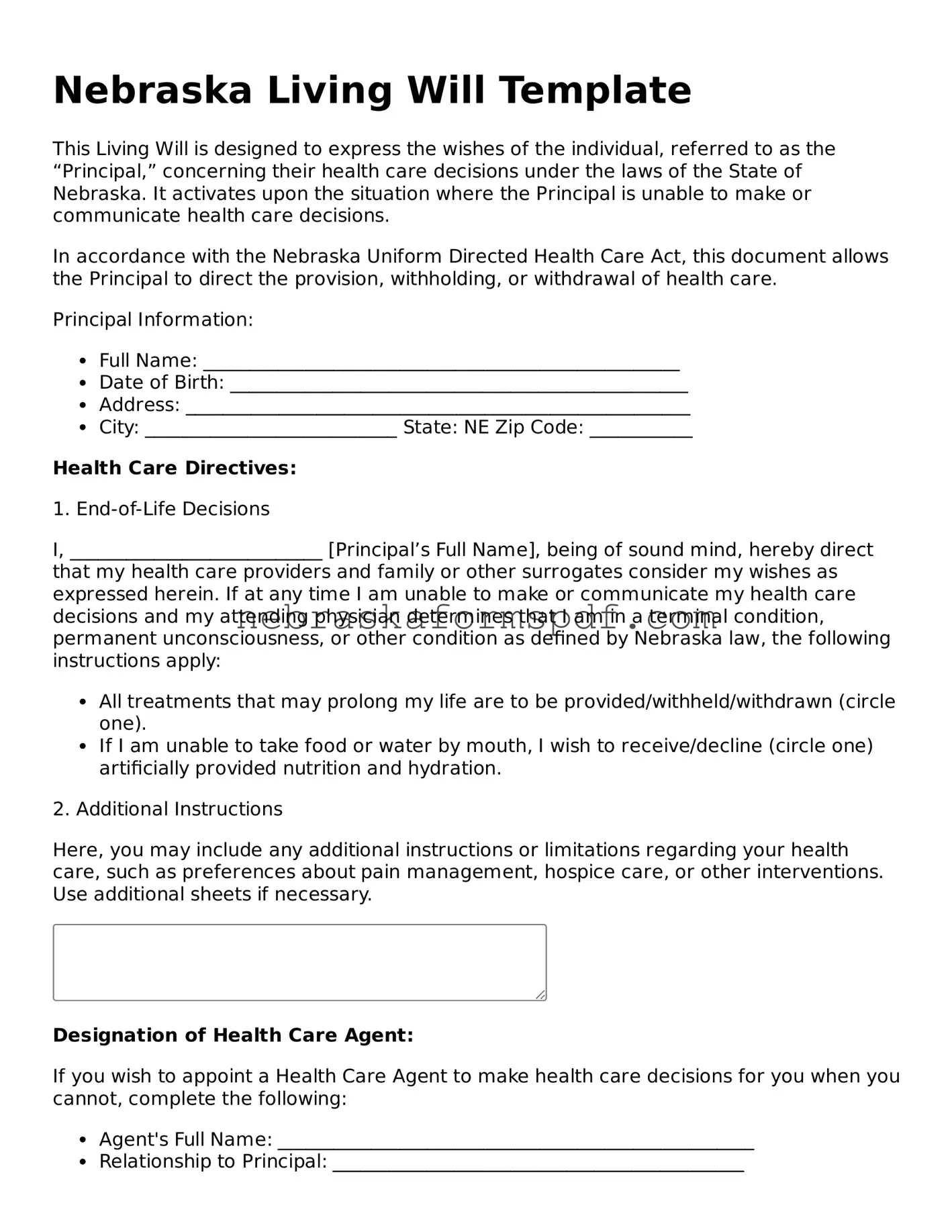Nebraska Living Will Template
This Living Will is designed to express the wishes of the individual, referred to as the “Principal,” concerning their health care decisions under the laws of the State of Nebraska. It activates upon the situation where the Principal is unable to make or communicate health care decisions.
In accordance with the Nebraska Uniform Directed Health Care Act, this document allows the Principal to direct the provision, withholding, or withdrawal of health care.
Principal Information:
- Full Name: ___________________________________________________
- Date of Birth: _________________________________________________
- Address: ______________________________________________________
- City: ___________________________ State: NE Zip Code: ___________
Health Care Directives:
1. End-of-Life Decisions
I, ___________________________ [Principal’s Full Name], being of sound mind, hereby direct that my health care providers and family or other surrogates consider my wishes as expressed herein. If at any time I am unable to make or communicate my health care decisions and my attending physician determines that I am in a terminal condition, permanent unconsciousness, or other condition as defined by Nebraska law, the following instructions apply:
- All treatments that may prolong my life are to be provided/withheld/withdrawn (circle one).
- If I am unable to take food or water by mouth, I wish to receive/decline (circle one) artificially provided nutrition and hydration.
2. Additional Instructions
Here, you may include any additional instructions or limitations regarding your health care, such as preferences about pain management, hospice care, or other interventions. Use additional sheets if necessary.
Designation of Health Care Agent:
If you wish to appoint a Health Care Agent to make health care decisions for you when you cannot, complete the following:
- Agent's Full Name: ___________________________________________________
- Relationship to Principal: ____________________________________________
- Address: ___________________________________________________________
- City: _________________________ State: NE Zip Code: ___________________
- Alternate Agent's Full Name (if primary agent is unavailable): ________________
- Relationship to Principal: ____________________________________________
- Address: ___________________________________________________________
- City: _________________________ State: NE Zip Code: ___________________
- Phone Number(s): ____________________________________________________
Signatures:
This Living Will shall be in effect until it is revoked. I understand the full import of this document and I am emotionally and mentally competent to make this Living Will.
Date: _______________________
Principal's Signature: _________________________________________________
Principal's Printed Name: ______________________________________________
Witnesses (must not be the designated agent, related to the principal by blood, marriage, or adoption, financially responsible for principal’s medical care, or entitled to any portion of principal’s estate):
- Witness 1 Name: ______________________________________________________
- Address: _____________________________________________________________
- Signature: _____________________________________ Date: ________________
- Witness 2 Name: ______________________________________________________
- Address: _____________________________________________________________
- Signature: _____________________________________ Date: ________________
Note: This document does not authorize the withholding or withdrawal of artificially provided nutrition and hydration unless the Principal specifies that intention clearly.
Please review this living will carefully. It is suggested that you consult with a healthcare provider and a lawyer to ensure your wishes are clearly understood and legally binding.

